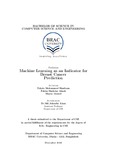| dc.contributor.advisor | Alam, Md.Ashraful | |
| dc.contributor.author | Shadman, Tahsin Mohammed | |
| dc.contributor.author | Akash, Fahim Shahriar | |
| dc.contributor.author | Ahmed, Mayaz | |
| dc.date.accessioned | 2019-02-18T05:36:46Z | |
| dc.date.available | 2019-02-18T05:36:46Z | |
| dc.date.copyright | 2018 | |
| dc.date.issued | 2018-12 | |
| dc.identifier.other | ID 14101060 | |
| dc.identifier.other | ID 14101146 | |
| dc.identifier.other | ID 14101143 | |
| dc.identifier.uri | http://hdl.handle.net/10361/11431 | |
| dc.description | Includes bibliographical references (pages 53-54). | |
| dc.description | Cataloged from PDF version of thesis. | |
| dc.description | This thesis is submitted in partial fulfilment of the requirements for the degree of Bachelor of Science in Computer Science and Engineering, 2018. | |
| dc.description.abstract | Affecting roughly around 10 percent of the women across the globe in some stage of their
lives,Breast Cancer has stood out to be one of the most feared and frequently occurring
cancers at present among women[1]. While the cure for this cancer is now available in almost
all first world and some of the third world nations,the main dilemma takes place when the
cancer can not be correctly identified at the very initial stages. Machine Learning,in this field
has proved to play a vital role in predicting diseases such as cancers alike.Classification and
data mining methods so far have been reliant and an effective way to classify data.Especially
in medical field,these methods have been used to predict and to make decisions.In this
paper,we have successfully used six classification techniques in the form of Decision Tree,
K-Neighbors, Linear Discriminant Analysis(LDA), Logistic Regression, Naïve Bayes and
Support Vector Machine(SVM)on the Wiscons in Breast Cancer(original)data sets,both
before and after applying Principal Component Analysis.The main objective is to assess the
correctness in classifying data with respect to efficiency and effectiveness of each algorithm
in terms of accuracy,precision,recall,specificity and F1 Score. Experimental results have
shown that Logistic Regression(recal score=1.000)and Support Vector Analysis(recall
score =1.000)with PCA performs better when it comes to Breast Cancer Prediction for his
data set.
Keywords:Classification;Decision tree;Machine learning;Support vector machine;
Principal Component Analysis,Recall,10-Fold cross-validation | en_US |
| dc.description.statementofresponsibility | Tahsin Mohamed Shadman | |
| dc.description.statementofresponsibility | Fahim Shahriar Akash | |
| dc.description.statementofresponsibility | Mayaz Ahmed | |
| dc.format.extent | 54 pages | |
| dc.language.iso | en | en_US |
| dc.publisher | BRAC University | en_US |
| dc.rights | BRAC University theses are protected by copyright. They may be viewed from this source for any purpose, but reproduction or distribution in any format is prohibited without written permission. | |
| dc.subject | Breast cancer | |
| dc.subject | Cancer
prediction | |
| dc.subject | Machine learning | |
| dc.subject.lcsh | Machine learning | |
| dc.title | Machine learning as an indicator for breast cancer prediction | en_US |
| dc.type | Thesis | en_US |
| dc.contributor.department | Department of Computer Science and Engineering, BRAC University | |
| dc.description.degree | B. Computer Science and Engineering | |

